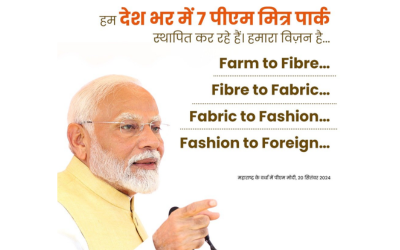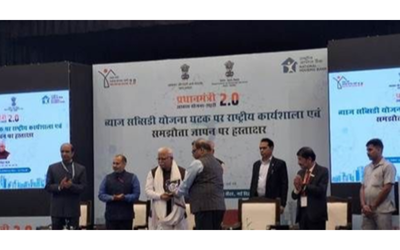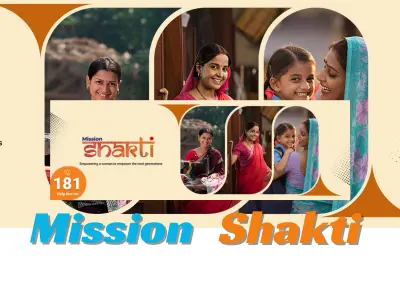Prime Minister Shri Narendra Modi addressed the National PM Vishwakarma Program in Wardha, Maharashtra today. He launched the ‘Acharya Chanakya Skill Development’ scheme and the ‘Punyashlok Ahilyadevi Holkar Women Startup Scheme’. Additionally, he distributed certificates and loans to PM Vishwakarma beneficiaries and unveiled a commemorative stamp to mark one year of progress under the PM Vishwakarma program initiative. Shri Modi also laid the foundation stone for the PM Mega Integrated Textile Regions and Apparel (PM MITRA) Park in Amravati, Maharashtra, and toured the exhibition displayed at the event.
In his address, the Prime Minister reflected on the Vishwakarma Puja celebrations held two days ago and noted that today’s event marks the successful completion of one year of the PM Vishwakarma program in Wardha. He emphasized the significance of this day, recalling that Mahatma Gandhi began his campaign against untouchability on this date in 1932.
Shri Modi highlighted that celebrating the first anniversary of the PM Vishwakarma Program (scheme) in Wardha, the spiritual home of Shri Vinova Bhave and the workplace of Mahatma Gandhi, symbolizes a blend of achievement and inspiration, infusing new energy into the vision of a developed India.
He stated that through the PM Vishwakarma Program, the government is committed to creating a better future through skill development and transforming hard work into prosperity, aligning with Mahatma Gandhi’s ideals. The Prime Minister congratulated everyone involved with the PM Vishwakarma Program.
विश्वकर्मा योजना की मूल भावना है- सम्मान, सामर्थ्य और समृद्धि! pic.twitter.com/vWhroRAL6T
— PMO India (@PMOIndia) September 20, 2024
Shri Modi underscored the importance of laying the foundation stone for the PM MITRA park, highlighting India’s efforts to elevate its textile industry to global prominence. He mentioned that India aims to restore the historical fame and recognition of its textile industries, and the PM MITRA park in Amaravati is a significant step in this direction. He congratulated the people of Amaravati on this achievement.
The Prime Minister explained that Wardha was chosen for the first anniversary of the PM Vishwakarma program because it is not just another government program but a scheme to harness traditional skills to propel India towards development. He pointed out that India’s traditional skills have been the foundation of many prosperous chapters in its history, with unmatched achievements in art, engineering, science, and metallurgy.
विश्वकर्मा योजना भारत के हजारों वर्ष पुराने कौशल को विकसित भारत के लिए इस्तेमाल करने का एक रोडमैप है। pic.twitter.com/VmaGXE1EvA
— PMO India (@PMOIndia) September 20, 2024
Shri Modi highlighted that India was once the world’s largest textile manufacturer and excelled in pottery and architecture. He noted that various skilled professionals, such as carpenters, blacksmiths, goldsmiths, potters, sculptors, cobblers, and mason-carpenters, were the backbone of India’s prosperity, spreading their knowledge and skills to every home.
He remarked that the British conspired to eradicate these indigenous skills, but Gandhiji promoted rural industry from Wardha. Shri Modi expressed regret that successive governments after independence did not give these skills the respect they deserved, leading to the neglect of the Vishwakarma community and hindering India’s progress.
Highlighting the current government’s resolve to revitalize traditional skills after 70 years of independence, the Prime Minister mentioned that ‘Samman, Samarthya, Samridhi’ (Respect, Capability, Prosperity) embodies the spirit of the PM Vishwakarma program. He stated that the objective is to respect traditional crafts, empower artisans, and ensure prosperity for the Vishwakarma community.
आज का भारत अपनी टेक्सटाइल इंडस्ट्री को वैश्विक बाज़ार में टॉप पर ले जाने के लिए काम कर रहा है: PM @narendramodi pic.twitter.com/i95wbq7Ril
— PMO India (@PMOIndia) September 20, 2024
Prime Minister Narendra Modi spoke at the National PM Vishwakarma Program in Wardha, Maharashtra. He launched two new schemes: the ‘Acharya Chanakya Skill Development’ and the ‘Punyashlok Ahilyadevi Holkar Women Startup Scheme’. He also handed out certificates and loans to beneficiaries and unveiled a commemorative stamp for the PM Vishwakarma initiative. Additionally, he laid the foundation stone for the PM MITRA Park in Amravati and toured an exhibition.
In his speech, Modi highlighted the significance of the day, noting that it marks one year of the PM Vishwakarma Program and coincides with the anniversary of Mahatma Gandhi’s campaign against untouchability. He emphasized the government’s commitment to skill development and prosperity through the PM Vishwakarma program, aligning with Gandhi’s ideals.
Modi also spoke about the PM MITRA park, aiming to boost India’s textile industry. He congratulated the people of Amravati for this achievement.
विश्वकर्मा योजना के जरिए श्रम से समृद्धि का, कौशल से बेहतर कल का संकल्प... pic.twitter.com/mlGKtj92qS
— PMO India (@PMOIndia) September 20, 2024
He explained that Wardha was chosen for the anniversary because of its historical significance and the importance of traditional skills in India’s prosperity. Modi noted that various skilled professionals were the backbone of India’s success and criticized past governments for neglecting these skills. He praised the current government’s efforts to revitalize traditional crafts.
Modi also addressed the farmers, highlighting the PM-Kisan Samman Nidhi scheme, which provides Rs 12,000 annually to farmers. He mentioned initiatives like crop insurance for Rs 1 and waived electricity bills. He discussed irrigation projects and tax reductions to support farmers, urging them to stay vigilant against false promises.
Modi warned against forces trying to divide society and urged citizens to uphold tradition and progress. He concluded by expressing his commitment to protecting Maharashtra’s identity and fulfilling its dreams.
The event was attended by various dignitaries, including the Governor and Chief Minister of Maharashtra, and other Union Ministers.
During the program, Prime Minister Narendra Modi distributed certificates and loans to PM Vishwakarma beneficiaries, symbolizing support for artisans. He also released a commemorative stamp to mark one year of progress under the scheme.
The Prime Minister laid the foundation stone for the PM Mega Integrated Textile Regions and Apparel (PM MITRA) Park in Amravati, Maharashtra. This 1000-acre park, developed by the Maharashtra Industrial Development Corporation (MIDC), is part of a larger initiative to establish seven PM MITRA Parks across India. These parks aim to make India a global hub for textile manufacturing and exports by creating world-class industrial infrastructure, attracting large-scale investments, including foreign direct investment (FDI), and fostering innovation and job creation.
Modi also launched the ‘Acharya Chanakya Skill Development’ scheme, which will establish training centers in colleges across Maharashtra. These centers will provide free skill development training to around 1,50,000 youths aged 15 to 45 each year, helping them become self-reliant and access various employment opportunities.
Additionally, the Prime Minister introduced the ‘Punyashlok Ahilyadevi Holkar Women Startup Scheme’. This scheme offers financial assistance of up to ₹25 lakh to women-led startups in Maharashtra, with 25% of the funds reserved for women from backward classes and economically weaker sections. The goal is to help these startups become self-reliant and independent.
The PM Vishwakarma Program (Scheme) is designed to uplift traditional artisans and craftsmen by providing them with financial support, skill development opportunities, and better market access. This initiative aims to preserve and promote traditional crafts and improve the livelihoods of artisans.
The PM Vishwakarma Program (Scheme) is designed to uplift traditional artisans and craftsmen by providing them with financial support, skill development opportunities, and better market access. This initiative aims to preserve and promote traditional crafts and improve the livelihoods of artisans.
Carpenter (Suthar/ Badhai). Self-employed artisans and craftspeople who work with their hands and tools to make/assemble wooden products or alter/repair wooden fixtures, mostly engaged in traditional/unorganised sector.
Boat Maker. Self-employed artisans and craftspeople who work with their hands and tools to make, assemble, alter and/or repair wooden boats in the unorganized sector.
Armourer. Self-employed artisans and craftspeople who manufacture, repair or service various types of arms like swords, shields, knives, helmets, etc. using hands and traditional tools employed in the unorganized sector.
Blacksmith (Lohar). Self-employed artisans and craftspeople, including blacksmiths, coppersmiths and bronzesmiths, who work with their hands and tools to forge metals like iron, copper, brass or bronze to get the required shape and size by heating, bending, hammering, etc. to create products in the unorganized sector.
Hammer and Tool Kit Maker. Self-employed artisans and craftspeople who work with their hands and tools to forge metals like iron to get the required shape and size by heating, bending, hammering, etc. to create hammer and tools in the unorganized sector.
Locksmith .Self-employed artisans and craftspeople found in small roadside stalls or travelling in streets who use hands and traditional tools like cutter, hammer, needle, threads, etc. in the unorganised sector to assemble, install and repair locks.
Sculptor (Moortikar, Stone Carver), Stone Breaker. Self-employed artisans and craftspeople also known as Shilpis or Moortikars who work with their hands and tools to carve, break or shape stones into three-dimensional artwork in the unorganised sector.
Goldsmith (Sonar). Self-employed goldsmiths/ sonar/swarnakars, silversmiths are the artisans and craftspeople who work with their hands and tools to create and design intricate jewellery and ornamental pieces with gold and other precious metals in the unorganized sector.
Potter (Kumhar). Self-employed artisans and craftspeople who work with their hands and tools to create pottery articles by moulding clay on a wheel and baking them in a kiln using traditional methods in the unorganized sector.
Cobbler (Charmakar)/ Shoesmith/ Footwear Artisan Self-employed artisans found in small roadside stalls or travelling in streets who use hands and traditional tools like cutter, hammer, needle, threads, etc. to manufacture, repair, restore and modify footwear.
Masons (Rajmistri). Masons are artisans and craftspeople who work with their hands and tools to perform works such as constructing structure using brick/block, plastering, cement, water proofing work, etc. in the unorganized sector. These artisans are also known as Rajmistri.
Basket/ Mat/ Broom Maker/ Coir Weaver. Basket Makers are self-employed artisans and craftspeople who weave pliable materials in order to make different types of baskets in the unorganised sector. Masons are artisans and craftspeople who work with their hands and tools to perform works such as constructing structure using brick/block, plastering, cement, water proofing work, etc. in the unorganized sector.
These artisans are also known as Rajmistri. Mat Makers/Coir Weavers are self-employed artisans and craftspeople who weave coir and bamboo materials to make items such as Baskets, Mats, etc. Broom Makers are self-employed artisans and craftspeople who process the bristles collected from various grass or plants such as coconut to make brooms by using tools such as wooden handle, scissors, knife, etc
Doll & Toy Maker (Traditional). Doll & Toy Makers (Traditional) are self-employed artisans and craftspeople who work with their hands and tools to make Dolls and Toys by using materials such as wool, threads, cotton, wood, etc.
Barber (Nai) . Self-employed artisans and craftspeople who work with their hands using scissors, blades, combs, shaving creams, etc. to provide grooming services to people, primarily hair cutting, shaving, etc.
Garland Maker (Maali). Self-employed artisans who work with their hands to create decorative garlands made of flowers, leaves, or other materials for use at rituals, or cultural or ceremonial occasions. They meticulously arrange and string together these elements, often incorporating different colours and textures, to produce beautiful and fragrant adornments for various cultural, religious, or celebratory purposes.
Washerman (Dhobi). Self-employed artisans and craftspeople who work with their hands and provide services such as washing and ironing of clothes to people. They primarily use manual washing techniques, local soaps, wooden stick ‘thapi’ and coal-based irons in the unorganised sector.
Tailor (Darzi). Self-employed artisans and craftspeople who work with their hands using sewing machine, scissors, buttons, fabrics, threads, needles, etc. to stitch and alter various dresses/garments in the unorganized sector.
Fishing net maker. Self-employed artisans and craftspeople who work with their hands using sewing machine, scissors, buttons, fabrics, threads, needles, etc. to stitch and alter various dresses/garments in the unorganized sector.
Provide loans and grants to artisans to help them sustain and grow their businesses.
Ensure that artisans have access to affordable credit.
Offer training programs to enhance the skills of artisans.
Introduce modern techniques and tools to improve productivity and quality.
Facilitate participation in national and international trade fairs.
Create online platforms for artisans to sell their products.
Artisans and Craftsmen: Individuals who are engaged in traditional crafts such as pottery, weaving, blacksmithing, carpentry, etc.
Age: Applicants must be between 18 and 60 years old.
Certification: Applicants must possess a valid artisan card issued by the relevant authority.
Loans: Up to ₹1 lakh with subsidized interest rates.
Grants: For purchasing raw materials, tools, and equipment
Workshops: Free training programs to upgrade skills.
Certification: Upon completion of training, artisans receive a certification.
Trade Fairs: Assistance in participating in trade fairs and exhibitions.
Online Platforms: Support in setting up online stores and marketing products digitally.
Application Process
Registration:
Apply online through the official PM Vishwakarma Program portal.
Fill out the application form with personal and professional details.
Documentation:
Submit necessary documents such as ID proof, artisan card, proof of age, and photographs of work.
Approval:
Applications are reviewed by a committee.
Approved applicants receive a notification and further instructions.
Nodal Agencies: Various government bodies, including the Ministry of Micro, Small and Medium Enterprises (MSME), will oversee the implementation.
Monitoring: Regular monitoring and evaluation to ensure the scheme’s objectives are met.
Support Centers: Establishment of support centers to assist artisans with the application process and provide ongoing support.
Insurance: Artisans may receive insurance coverage for their tools and equipment.
Mentorship: Experienced artisans and industry experts will mentor new artisans.
Networking: Opportunities for artisans to network with buyers, suppliers, and other stakeholders.



